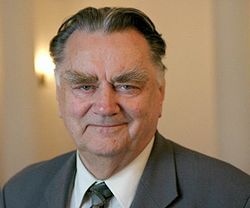1995 Polish presidential election
From Wikipedia, the free encyclopedia
Presidential elections were held in Poland on 5 November 1995, with a second round on 19 November.[1] The leader of Social Democracy, Aleksander Kwaśniewski, and incumbent President Lech Wałęsa advanced to the second round. Kwaśniewski won the election with 52% of the vote in the run-off against 48% for Wałęsa.
| |||||||||||||||||
| Turnout | 64.70% (first round) 4.07pp 68.23% (second round) 14.83pp | ||||||||||||||||
|---|---|---|---|---|---|---|---|---|---|---|---|---|---|---|---|---|---|
| |||||||||||||||||
| |||||||||||||||||
Background
Summarize
Perspective
Wałęsa's inauguration
Lech Wałęsa was elected and sworn in as President in December 1990, succeeding Wojciech Jaruzelski and leading to the ultimate end of communist rule in Poland. Soon after his inauguration, Wałęsa's presently primary rival Prime Minister Tadeusz Mazowiecki resigned and was followed by Jan Krzysztof Bielecki, a liberal and economist relatively loyal to Wałęsa. Regardless of the cabinet changes, Bielecki's time as Prime Minister would largely follow the course set by his predecessor.[2]
1991 parliamentary election
The 1991 Polish parliamentary election saw the Democratic Union (UD) become the largest party, later supplanted by the Democratic Left Alliance (SLD) after Aleksander Hall's Conservatives split off from UD. After the downfall of Jan Olszewski's cabinet, and Hanna Suchocka's cabinet which succeeded it, new elections were called.
1993 parliamentary election
The 1993 Polish parliamentary election saw SLD become the largest party, winning a plurality of 171 (37.2%) of seats while receiving only 20.4% of votes. SLD governed in a coalition with the Polish People's Party.
Despite peaking at 70% in approval near the start of his term, by March 1995, Wałęsa's presidential approval rating reached 25%, with 64% disapproval.[3]
Candidate selection
Summarize
Perspective
Social Democracy of the Republic of Poland
| Aleksander Kwaśniewski | |||||||||||||||||||||||||||||
|---|---|---|---|---|---|---|---|---|---|---|---|---|---|---|---|---|---|---|---|---|---|---|---|---|---|---|---|---|---|
| Member of the Sejm (1989-2005) | |||||||||||||||||||||||||||||
| Potential candidates | ||||||||||
|---|---|---|---|---|---|---|---|---|---|---|
| Aleksander Kwaśniewski | Józef Oleksy | |||||||||
| Chairman of Social Democracy (1990-1995) |
Prime Minister of Poland (1995-1996) | |||||||||
During SdRP's Congress on 13 May, Kwaśniewski secured his party's endorsement for President with 296 out of 300 votes. Some delegates believed Józef Oleksy should become the candidate instead.[2][4] A poll conducted in December 1994 suggested 71% of potential SLD voters supported Kwaśniewski as the party's candidate, 7% supported Włodzimierz Cimoszewicz and 16% supported Oleksy.[5]
Nonpartisan Bloc for Support of Reforms
Lech Wałęsa was selected as the Bloc's candidate.[2]
Freedom Union
| Jacek Kuroń | |||||||||||||||||||||||||||||
|---|---|---|---|---|---|---|---|---|---|---|---|---|---|---|---|---|---|---|---|---|---|---|---|---|---|---|---|---|---|
| Member of the Sejm (1989-1993) | |||||||||||||||||||||||||||||
| Potential candidates | ||||||||||
|---|---|---|---|---|---|---|---|---|---|---|
| Jacek Kuroń | Janusz Onyszkiewicz | Hanna Suchocka | ||||||||
| Minister of Labour and Social Policy (1992-1993) |
Minister of National Defence (1992-1993) |
Prime Minister of Poland (1992-1993) | ||||||||
During the 2nd Congress of the Freedom Union, three candidates decided to enter the party's candidate selection process: Jacek Kuroń, Janusz Onyszkiewicz and Hanna Suchocka. Suchocka, despite being the highest-ranking of the former three candidates, came last in the first round. The second round of voting saw Kuroń defeat Onyszkiewicz by a slight margin of 11 votes, and the former Minister of Labour became the party's official candidate for President.[2] A poll conducted in December 1994 suggested 53% of potential UW voters supported Kuroń as the party's candidate, 15% supported Leszek Balcerowicz and 25% supported Suchocka.[5]
Movement for the Republic
Olszewski was selected as the Movement's candidate.[2]
Polish People's Party
| Waldemar Pawlak | |||||||||||||||||||||||||||||
|---|---|---|---|---|---|---|---|---|---|---|---|---|---|---|---|---|---|---|---|---|---|---|---|---|---|---|---|---|---|
| Member of the Sejm (1989-1993) | |||||||||||||||||||||||||||||
Pawlak was selected as the party's candidate.[2] A poll conducted in December 1994 suggested 68% of potential PSL voters supported Pawlak as the party's candidate, 1% supported Janusz Piechociński and 9% supported Józef Zych.[5]
Convent of St. Catherine
| Hanna Gronkiewcz-Waltz | |||||||||||||||||||||||||||||
|---|---|---|---|---|---|---|---|---|---|---|---|---|---|---|---|---|---|---|---|---|---|---|---|---|---|---|---|---|---|
| President of the National Bank (1992-2001) | |||||||||||||||||||||||||||||
| Potential candidates | ||||||||||
|---|---|---|---|---|---|---|---|---|---|---|
| Hanna Gronkiewicz-Waltz | Leszek Moczulski | Jan Olszewski | Adam Strzembosz | Henryk Bąk | Wojciech Ziembiński | Roman Ciesielski | Jan Parys | |||
 |
||||||||||
| President of the National Bank of Poland (1992-2001) |
Member of the Sejm (1993-1997) |
Prime Minister of Poland (1991-1992) |
Chairman of the Supreme Court of Poland (1990-1998) |
Deputy Marshal of the Sejm (1991-1993) |
Anti-communist oppositionist | Member of the Senat (1989-1991) |
Minister of National Defence (1991-1992) | |||
In November 1994, the Convent of St. Catherine was organised by Józef Maj, coordinating several extraparliamentary center to right-wing parties, like the Christian-Democratic Labour Party, Confederation of Independent Poland, Party of Christian Democrats, Peasants' Agreement, Polish People's Party (Mikołaczykowskie faction), Movement for the Republic, Third Republic Movement, Party of Polish Democracy, National-Democratic Party, Christian National Union, Polish Union, Solidarity or Rural Solidarity. The Convent's purpose was to serve as a discussion forum for the marginal extraparliamentary parties trying to coalesce into a political force able to cross the 5% threshold and enter the Sejm after the last election's wipeout result for the fragmented parties.[6] In the Summer of 1995, the Convent agreed to hold meetings to select a joint presidential candidate for that year's election. Out of the many candidates that expressed interest in becoming the candidate, the quickest to withdraw was Jan Parys, soon after Roman Ciesielski, Wojciech Ziembinski, Henryk Bąk and Adam Strzembosz stopped being contenders. The remaining candidates, Hanna Gronkiewicz-Waltz, Leszek Moczulski and Jan Olszewski, ultimately entered a dispute over the results a ballot held to elect the Convent's candidate, as on the 19th of July, Gronkiewicz-Waltz's, followed by Olszewski's supporters both claimed victory for their candidates. Due to the inability of the Convent to decide on a candidate, it was ultimately disbanded and all three of the remaining candidates ran their own presidential campaigns, though Moczulski ultimately withdrew and endorsed Wałęsa.[6][2]
Other candidates
| Tadeusz Zieliński | Janusz Korwin-Mikke | Andrzej Lepper | Jan Pietrzak | Tadeusz Koźluk | Kazimierz Piotrowicz | Leszek Bubel |
|---|---|---|---|---|---|---|
 |
 |
|||||
| Ombudsman in Poland (1992-1996) |
Member of the Sejm (1991-1993) |
Agriculturist | Satirist | Lawyer | Entrepreneur | Member of the Sejm (1991-1993) |
Withdrawn candidates
| Lech Kaczyński | Marek Markiewicz | Leszek Moczulski | Bogdan Pawłowski |
|---|---|---|---|
 | |||
| Member of the Sejm (1991-1993) |
Chairman of KRRiT (1993-1994) |
Member of the Sejm (1993-1997) |
Entrepreneur |
| Endorsed Jan Olszewski | Endorsed Lech Wałęsa | Endorsed Lech Wałęsa | Endorsed Lech Wałęsa |
Rejected candidates
The following candidates registered to run, but failed to cross the threshold of 100,000 signatures required to run in the election:
- Bolesław Tejkowski (Chairman of the Polish National Community)
Campaign
Summarize
Perspective
The two favorites throughout the course of the campaign were the leader of the post-communist SLD Aleksander Kwaśniewski and incumbent President Lech Wałęsa. Kwaśniewski ran a campaign of change and blamed the economic problems in Poland on the post-Solidarity right. His campaign slogan was "Let's choose the future" (Wybierzmy przyszłość). Political opponents challenged his candidacy, and produced evidence to show that he had lied about his education in registration documents and public presentations. There was also some mystery over his graduation from university. A law court confirmed that Kwaśniewski had lied about his record, but did not penalize him for it, judging the information irrelevant to the election result. Meanwhile, Wałęsa was a very unpopular President and some opinion polls even showed that he might not make it into the second round. He was challenged by other post-Solidarity politicians of all sides of the political spectrum ranging from liberal former Minister of Labour and Social Policy Jacek Kuroń to conservative former Prime Minister Jan Olszewski. Rather than focusing on his presidency, he focused on his personal image as an everyday man turned international hero that was created for him while he was chairman of Solidarity. His campaign slogan was "There are many candidates but there is only one Lech Wałęsa" (Kandydatów jest wielu – Lech Wałęsa tylko jeden).[2]
Opinion polls
| Poll publisher | Date of polling | Kwaśniewski SdRP |
Wałęsa IN |
Kuroń UW |
Olszewski RdR |
Pawlak PSL |
Zieliński UP |
Gronkiewicz-Waltz IN |
Others and Undecideds | |||
|---|---|---|---|---|---|---|---|---|---|---|---|---|
| Election results | 5 November 1995 | 35.11 | 33.11 | 9.22 | 6.86 | 4.31 | 3.53 | 2.76 | 5.1 | |||
| Gazeta Wyborcza | 1 November 1995 | 34 | 31 | 11 | 4 | 3 | 6 | 4 | 7 | |||
| Wprost | 24 October 1995 | 34 | 24 | 11 | 4 | 6 | 7 | 7 | 7 | |||
| Gazeta Wyborcza | 22 October 1995 | 27 | 23 | 8 | 3 | 4 | 5 | 5 | 25 | |||
| Września Primary | 15 October 1995 | 48.8 | 12.7 | 38.5 | ||||||||
| Gazeta Wyborcza | 15 October 1995 | 27 | 22 | 7 | 3 | 4 | 6 | 8 | 23 | |||
| Gazeta Wyborcza | 9 October 1995 | 27 | 17 | 6 | 6 | 5 | 10 | 12 | 17 | |||
| Gazeta Wyborcza | 15 September 1995 | 26 | 12 | 8 | 2 | 4 | 11 | 12 | 24 | |||
| Election called by Sejm Marshal Józef Zych (9 September 1995)[7] | ||||||||||||
| Wprost | 27 August 1995 | 23 | 14 | 10 | 2 | 3 | 11 | 12 | 25 | |||
| Wprost | 9 July 1995 | 26 | 11 | 12 | <1 | 4 | 11 | 12 | 26 | |||
| Wprost | 6 June 1995 | 20 | 8 | 15 | 3 | 3 | 15 | <1 | 36 | |||
| Sources: Pienkos,[8] Dudek[2] | ||||||||||||
Results

Kwaśniewski won with 52% of the vote in the run-off. 65% of voters voted in the first round and 68% in the second round.
| Candidate | Party | First round | Second round | |||
|---|---|---|---|---|---|---|
| Votes | % | Votes | % | |||
| Aleksander Kwaśniewski | Social Democracy of the Republic of Poland[9] | 6,275,670 | 35.11 | 9,704,439 | 51.72 | |
| Lech Wałęsa | Independent | 5,917,328 | 33.11 | 9,058,176 | 48.28 | |
| Jacek Kuroń | Freedom Union | 1,646,946 | 9.22 | |||
| Jan Olszewski | Movement for the Republic | 1,225,453 | 6.86 | |||
| Waldemar Pawlak | Polish People's Party | 770,419 | 4.31 | |||
| Tadeusz Zieliński | Labor Union | 631,432 | 3.53 | |||
| Hanna Gronkiewicz-Waltz | Independent | 492,628 | 2.76 | |||
| Janusz Korwin-Mikke | Real Politics Union | 428,969 | 2.40 | |||
| Andrzej Lepper | Self-Defence of the Republic of Poland | 235,797 | 1.32 | |||
| Jan Pietrzak | Independent | 201,033 | 1.12 | |||
| Tadeusz Koźluk | Independent | 27,259 | 0.15 | |||
| Kazimierz Piotrowicz | Independent | 12,591 | 0.07 | |||
| Leszek Bubel | Independent | 6,825 | 0.04 | |||
| Total | 17,872,350 | 100.00 | 18,762,615 | 100.00 | ||
| Valid votes | 17,872,350 | 98.18 | 18,762,615 | 98.00 | ||
| Invalid/blank votes | 330,868 | 1.82 | 383,881 | 2.00 | ||
| Total votes | 18,203,218 | 100.00 | 19,146,496 | 100.00 | ||
| Registered voters/turnout | 28,136,332 | 64.70 | 28,062,409 | 68.23 | ||
| Source: Nohlen & Stöver | ||||||
Aftermath
Lech Wałęsa contested the election results, but they were reaffirmed by the Supreme Court.[2]
Notes
- The President of Poland traditionally resigns from party membership after taking office. Although Wałęsa was officially an independent, his campaign was endorsed and funded by the Nonpartisan Bloc for Support of Reforms and National Democratic Party.
References
Wikiwand - on
Seamless Wikipedia browsing. On steroids.


























